Friday, December 31, 2010
 5:04 PM |
New Year on Dartmoor
5:04 PM |
New Year on Dartmoor
 By Sylvia Plath
By Sylvia PlathThis is newness: every little tawdry
Obstacle glass-wrapped and peculiar,
Glinting and clinking in a saint's falsetto. Only you
Don't know what to make of the sudden slippiness,
The blind, white, awful, inaccessible slant.
There's no getting up it by the words you know.
No getting up by elephant or wheel or shoe.
We have only come to look. You are too new
To want the world in a glass hat.
Labels: holidays, poetry, writers
[0] This is Where You Bite the Sandwich

Thursday, December 30, 2010
 7:28 PM |
Hitler's Tea Party
7:28 PM |
Hitler's Tea Party
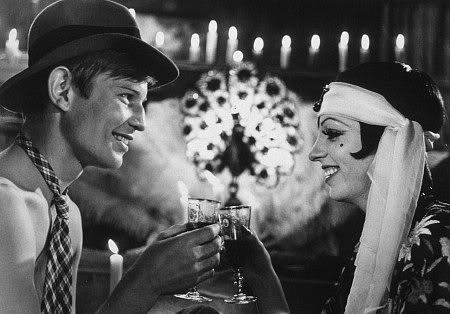
I love Bob Fosse's
Cabaret [1972], that classic campy musical about Berlin in the Roaring '30s, before the Nazi took to power. Much has been said about this film, a bisexual love story between a luminous Liza Minnelli and Michael York (before he became the Anti-Christ in all those
Left Behind movies), and I won't add anymore to them, except that I'm happy to note I've seen this film finally, in its entirety, without pause or distraction. All I want to say however is that the resurgent Nazi Party in the film looks and sounds just much like the Tea Party in America right now -- staples of comedy at present, but in danger of taking hold of American future soon enough. (They already have Congress.) I sincerely hope this doesn't happen. In any case, Heil Sarah Palin and Glenn Bleck!
Labels: film, music, politics, queer
[0] This is Where You Bite the Sandwich

 3:50 PM |
A Christmas Dinner
3:50 PM |
A Christmas Dinner
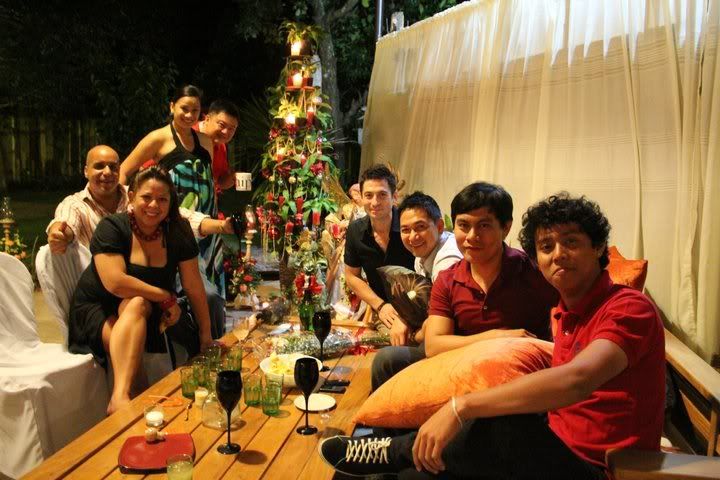
At Arlene's lower Valencia house for Christmas Eve dinner with some of our friends. She's always the perfect hostess, perhaps Dumaguete's best. Photography by Hersley-Ven Casero.
Labels: dumaguete, food, friends, holidays, party
[0] This is Where You Bite the Sandwich

 1:39 PM |
Beautiful Interlopers
1:39 PM |
Beautiful Interlopers
I saw two films in succession that are so similar in story, but are so different in execution -- where execution finally makes one film "art," and the other one a mediocre retread into Hallmark Channel territory. Which leads me to toy once again with the notion that it's not really about the content anymore, it's the form that counts. Because all stories have been told anyway; how you tell one becomes the ultimate game-changer.
Luca Guadagnino's
I Am Love [2010] and Chip Hale's
Mulligans [2008] are cut from the same cloth. They are stories of a family that has its settled ways, comfortable in affluence. Along comes an outsider -- an interloper, essentially -- whose personality and passion ignite changes in the status quo, leading to tragedy or a shakedown of perfectly preserved pretense. But of course love endures. That's the uniting storyline, but how differently they are told. The same cloth begets different garments.

In Hale's film, we are led along the familiar emotional rhythms we've come to expect in middling dramas such as this, and we respond just so. It tells about a young family, the son of which invites home his best friend from college for the summer. The friend soon comes out gay, which leads to fundamental introspective examination by each one in the family -- including the father, who realizes that he, too, is gay, and in love with his son's best friend. Competently photographed,
Mulligans (a term in golf, which becomes a kind of metaphor for the dramatic crisis in the film) rises a little above the average by actors who more or less hit the mark, and there is enough tension in the screenplay that keeps us guessing. In the end, however, it becomes a forgettable melodrama, and a week from now, I will probably have a little difficulty remembering the title, or even remembering I've seen this. It's just not art, although while watching it, I felt it, it moved me a little. (But eating great shawarma can also move me, a little.)

Guadagnino's hypnotic film, however, shows how cinematic art can be made: through a thorough knowledge of the vocabulary of cinema, the elements keenly manipulated to advance -- in visual and narrative terms -- this story of a Russian woman married to the patriarch of a rich Milanese family, who finds passion and a dream of escape from the stifling contours of her rigidly ordered life in a young chef, the best friend of her son. We somehow know this film will end in tragedy, but even given that, Guadagnino keeps us guessing with every passing scene, so much so that when the tragic finally strikes, it comes out of nowhere, striking us dumb with its brutality and suddenness. This is a beautifully made film, gorgeously shot, and captures the Italian landscape in a washed out but also paradoxically deeply colorful terrible beauty. It is so nuanced and so sure of its every cinematic intentions, and so loving of its influences that include Michaelangelo Antonioni and Alfred Hitchcock and Sally Potter. The key to its success, aside from Tilda Swinton's unbelievable performance as Emma, is the way Guadagnino handles his camera: he uses it as a caress, as a stalking presence, as a detached observer of high society life, as a microscope lens, as a swooping roller coaster that underlines what is not said -- desire, fear, anger, sadness, joy, pain. It is all about the visual choices that make something a masterpiece of an artist who knows what he is going for: in the delicate but also sudden seduction scene between Antonio and Emma in the mountains, for example, we observe Emma taking in the view with a measure of nonchalance dipped in excitement -- and then suddenly, we hear a soft crackling sound from behind her, the camera goes out of focus, and in that blurry vision that approximates desire and giving in, we see their obscure figures kissing hungrily. That cinematographic choice felt right, and underlined some more the consummate artistry that this film is made of. Every detail is not wasted and means something -- the ukha soup, the seating plan for every meticulously prepared dinner, the ritual of taking off clothes and jewelry, the daughter's lesbianism, the pool made of sharply angled marble, the housekeeper's emotional connection with the family, the book that must remain hidden, the names that can't be recalled, the fact that she has been named Emma by her husband who tells her, "You don't exist" -- all these disparate things mean something, and contribute to such throbbing organic whole. In the middle of all these is the incandescent performance of Tilda Swinton, a Scottish actress playing a trapped Russian woman living in Milan and speaks perfect Italian with a Russian accent. That technicality alone, equal to the chameleon-like power of Meryl Streep, amazes me. That Ms. Swinton is able to marshall all of that to a subtle and also devastating performance is a thing of beauty. Every muscle in her, as she does her craft, shouts sheer believability. This is such a sensual film, a work of art in every way. Set side-by-side with the merely passable, mediocrity suddenly seems almost criminal.
Labels: film, love, queer
[0] This is Where You Bite the Sandwich

Tuesday, December 28, 2010
 11:25 AM |
Miss Carson McCullers Talks About Love
11:25 AM |
Miss Carson McCullers Talks About Love
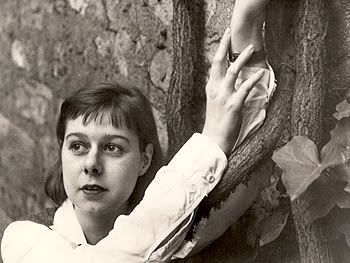 First of all, love is a joint experience between two persons — but the fact that it is a joint experience does not mean that it is a similar experience to the two people involved. There are the lover and the beloved, but these two come from different countries. Often the beloved is only a stimulus for all the stored-up love which had lain quiet within the lover for a long time hitherto. And somehow every lover knows this. He feels in his soul that his love is a solitary thing. He comes to know a new, strange loneliness and it is this knowledge which makes him suffer. So there is only one thing for the lover to do. He must house his love within himself as best he can; he must create for himself a whole new inward world — a world intense and strange, complete in himself. Let it be added here that this lover about whom we speak need not necessarily be a young man saving for a wedding ring — this lover can be man, woman, child, or indeed any human creature on this earth.
First of all, love is a joint experience between two persons — but the fact that it is a joint experience does not mean that it is a similar experience to the two people involved. There are the lover and the beloved, but these two come from different countries. Often the beloved is only a stimulus for all the stored-up love which had lain quiet within the lover for a long time hitherto. And somehow every lover knows this. He feels in his soul that his love is a solitary thing. He comes to know a new, strange loneliness and it is this knowledge which makes him suffer. So there is only one thing for the lover to do. He must house his love within himself as best he can; he must create for himself a whole new inward world — a world intense and strange, complete in himself. Let it be added here that this lover about whom we speak need not necessarily be a young man saving for a wedding ring — this lover can be man, woman, child, or indeed any human creature on this earth.
Now, the beloved can also be of any description. The most outlandish people can be the stimulus for love. A man may be a doddering great-grandfather and still love only a strange girl he saw in the streets of Cheehaw one afternoon two decades past. The preacher may love a fallen woman. The beloved may be treacherous, greasy-headed, and given to evil habits. Yes, and the lover may see this as clearly as anyone else — but that does not affect the evolution of his love one whit. A most mediocre person can be the object of a love which is wild, extravagant, and beautiful as the poison lilies of the swamp. A good man may be the stimulus for a love both violent and debased, or a jabbering madman may bring about in the soul of someone a tender and simple idyll.
Therefore, the value and quality of any love is determined solely by the lover himself.
It is for this reason that most of us would rather love than be loved. Almost everyone wants to be the lover. And the curt truth is that, in a deep secret way, the state of being beloved is intolerable to many. The beloved fears and hates the lover, and with the best of reasons. For the lover is forever trying to strip bare his beloved. The lover craves any possible relation with the beloved, even if this experience can cause him only pain.
~ From "The Ballad of the Sad Café"Labels: books, fiction, love, quotes, writers
[0] This is Where You Bite the Sandwich

 1:24 AM |
A Fool for Love
1:24 AM |
A Fool for Love
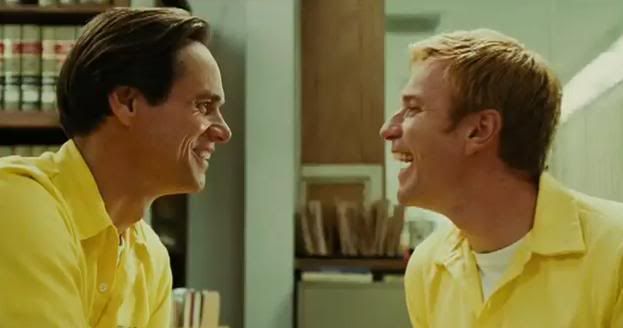
Here is an uproarious and original comedy that stars one of Hollywood's genuine funnymen (Jim Carrey) and one of cinema's genuine chameleons (Ewan McGregor). Here is a movie that expands the notion of fact being so much weirder and more fantastic than fiction. Here is a movie that a lot of critics loved. But whatever happened to Glenn Ficarra and John Requa's
I Love You Philip Morris [2010]? It's Oscar-bait material, but in this season of awards and top-ten lists, it's not being mentioned as a contender. Mr. Carrey is glorious here, and Mr. McGregor is something else. Already though, the film has had a checkered history: it meandered its way to theaters for months and months, but finally did not find an audience, given the haphazard way it has been handled by its distributors. (Nobody wanted to pick it up.) You have to ask: what went wrong? The marketing? The belated distribution? Or perhaps even homophobia? Perhaps. This is after all the story of the real-life Steve Russell, a gay man and a relentlessly inventive con man whose run-ins with the law have become quite legendary -- all of them a result of pursuing the love of his life, Philip Morris, a sweet-natured and blonde Southern boy he meets in prison, while serving a jail sentence for fraud. In a life rife with lies and shape-shifting (manifested as metaphor through moving clouds, a recurring motif in the film), Russell -- an ex-cop and former Bible-swearing family man -- has impersonated lawyers and CFOs and doctors and what-have-you's, and has even faked his own death by AIDS. Underneath all that is a fool for love, the only truth he has come to admit, near the end of the film. This is an extraordinary film of an extraordinary life. It is also relentlessly funny and both Carrey and McGregor deserve accolades for their chemistry and for making us believe that all these lies are the makings of magic. Too bad it is not receiving the kind of attention it deserves.
Labels: comedians, film, queer
[0] This is Where You Bite the Sandwich

Monday, December 27, 2010
 10:37 PM |
Music That Does Not Go On
10:37 PM |
Music That Does Not Go On
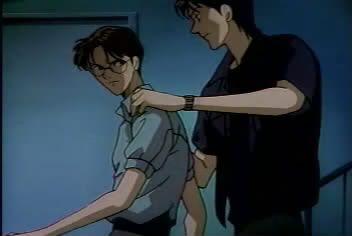
The anime adaptation of Koh Akizuki's
Fujimi Block No. 2 Symphony Orchestra: Cold Front -- The Storm After the Rain [1998] is a curious thing. While it has most of the
yaoi elements we have come to expect of this genre of Japanese animation -- the older, talented, dominant, but distant
seme; the younger, protesting, but ultimately willing
uke; the rape fantasy that titillates and verges on the strangely romantic -- it somehow fails to involve, the way Momo Sakura's
Boku no Sekusharu Harasumento [1994-1995] or Shungiku Nakamura's
Junjō Romanchika [2008] did. Which is just too bad because it makes great use of classical music, the way Fumi Yoshinaga's manga
Antique Bakery did with pastries. You may already know the story, if we follow the formula for yaoi: Tonoin Kei, a talented conductor, has come to lead a small orchestra, and meets the group's first violinist and concert master Morimura Yuuki. Misunderstanding, spiced with
yaoi love confessions, ensues. The OVA tells the story through a fragmented time-frame, which makes it a bit difficult to follow. In the end, however, it just falls flat and does not engage. Which may be why it only ran for one episode more than a decade ago in Japanese TV.
Labels: cartoons, film, queer
[0] This is Where You Bite the Sandwich


Watching Thanyatorn Siwanukrow’s
Rak Nai Thi Plai Roong [
Right By Me, 2005], I am convinced of this: there are no bad stories, only bad storytelling. This effort, purportedly Thailand’s first coming-out film, is such a waste of time that not even the smoldering presence of Palat Ananwattanasiri could remedy an inch of this travesty. I’m not even going to bother describing it, or dwelling more about it.
Labels: film, queer
[0] This is Where You Bite the Sandwich

 1:29 AM |
Good Story, Bad Choices
1:29 AM |
Good Story, Bad Choices
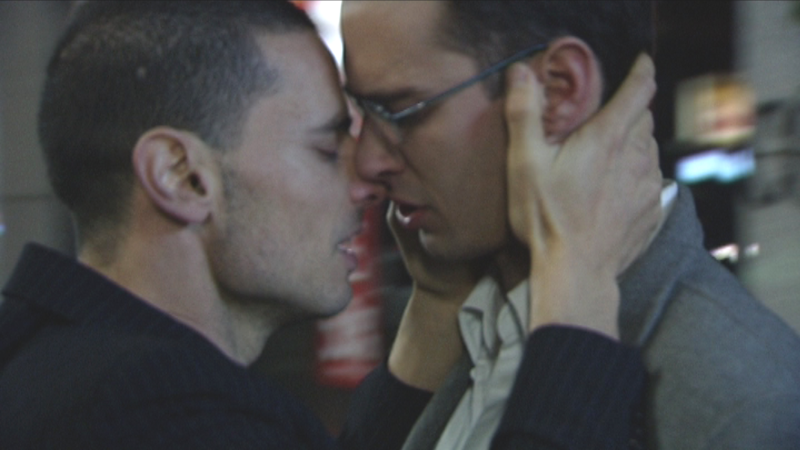
I don't know what kind of brainstorming happened that paved the way to the final creative choices for Yair Hochner's
Antarctica [2008], but parts of this Israeli film are godawful -- the horrendous title design, the hokey coffee house music, the casting of a transvestite to play the part of the mother, the inclusion of an alien invasion subplot, the cheap-looking cinematography, among others. Which is sad because the main story -- about five gay men and two lesbians whose lives unknowingly circle each other in Tel Aviv -- is actually quite interesting and most of the actors quite appealing and talented enough to give the film such a dramatic draw. It is thus a tragic disservice to their talents that they are framed in an enterprise that wastes their efforts with such inept sense of craft. What was Hochner thinking? The film begins with such edge -- an extended 15-minute intro full of in-your-face depictions of one-night stands centering on a guy named Boaz, who turns out to be a minor character. Instead, the film chooses, to our surprised delight, to follow the lives of his four tricks, as they stumble through each other's existences haphazardly -- through blind dates, coincidental meetings, and the like. What the story aims to do is to perhaps create a passable tapestry of gay lives in an Israeli metropolis, and in that regard it is successful. I was drawn in; I found their stories riveting. But to surround those stories with the unnecessary noise of inept filmmaking choices was too distracting for comfort. Which is just too bad.
Labels: film, queer
[0] This is Where You Bite the Sandwich

Sunday, December 26, 2010
 9:13 PM |
Here's to Desserts
9:13 PM |
Here's to Desserts
 "No one [is] at the least hungry anymore, but that is precisely what is so good about the moment devoted to pastries: they can only be appreciated to the full extent of their subtlety when they are not eaten to assuage our hunger, when the orgy of their sugary sweetness is not destined to fill some primary need but to coat our palate with all the benevolence of the world."
"No one [is] at the least hungry anymore, but that is precisely what is so good about the moment devoted to pastries: they can only be appreciated to the full extent of their subtlety when they are not eaten to assuage our hunger, when the orgy of their sugary sweetness is not destined to fill some primary need but to coat our palate with all the benevolence of the world."
~ Muriel Barbery, Gourmet RhapsodyLabels: books, food, quotes
[0] This is Where You Bite the Sandwich

 8:52 PM |
A Guide Through Pain
8:52 PM |
A Guide Through Pain

John Cameron Mitchell has never been one to shy away from the exploration of the rawness of our humanity. He steps into unbearable regions of ourselves with the rapt attention of a poet, and comes out of these explorations with precise, unflinching records of how we deal with all sorts of pain or loss. We see that in both
Hedwig and the Angry Inch [2001], his directorial debut about a bitter transgendered rock singer with a botched sex-change operation, and later in
Shortbus [2006], his controversial follow-up which is about a disparate group of New Yorkers grappling with sex, human connection, and sexuality, all done in splendidly pornographic details. But both films he did with an amazing command of cinematic poetry, and came off with such striking insights of what makes us human -- our frailty, our courage, our savagery, our hopefulness, our incomprehensible methods of coping with pain.
He carries over that poetic take of the rawness of what makes us tick in his splendid, perfectly-tuned adaptation of David Lindsay-Abaire's Tony-winning Broadway play. In
Rabbit Hole [2010], we follow Becka and Howie, a young couple dealing with grief, eight months after the death of their young son who was ran over by a drunken teenager. I say "poetic" because Mr. Mitchell does not slap us with the story of their pain in an unwanted avalanche of hysteria. Instead, he pulls us slowly into their dilemma with quietly staged scenes that add and add to the tension as the minutes go by, without us reeling from the horror of it all. Instead, we become engaged in the pain. Mr. Mitchell makes it familiar, even when it seems ultimately unbearable -- and when Becka and Howie finally allow themselves to erupt, we welcome the outbursts as if they were our own. Note for example the scene when Becka rebukes her mother's attempt to comfort her with a talk about God. She retorts: "God is a sadistic prick. 'Worship me and I'll treat you like shit.' No wonder you like him, he's like Dad." A slap in the face, indeed -- but we understand it, we know where it is coming from. It helps that all this pain is being channeled by Aaron Eckhart and Nicole Kidman -- she in a bravura performance that may be the best of her career. It is a terrifying role that can go horribly wrong in less capable hands. But Ms. Kidman manages to make it her own and manages to make it so unflinchingly human that we come to identify well with her struggle, with her outbursts, with her strange ways of coping. Mr. Lindsay-Abaire, who also writes the screenplay, also gives Dianne Wiest's mother a startling and moving monologue about the loss of a child somewhere in the middle of the film -- and it feels and sounds true, the voice of a mother who has come to know that kind of pain, and has tamed it, if only a little. This is a film that must be watched.
Labels: film
[0] This is Where You Bite the Sandwich

 8:08 PM |
Poor, Poor Ramona
8:08 PM |
Poor, Poor Ramona
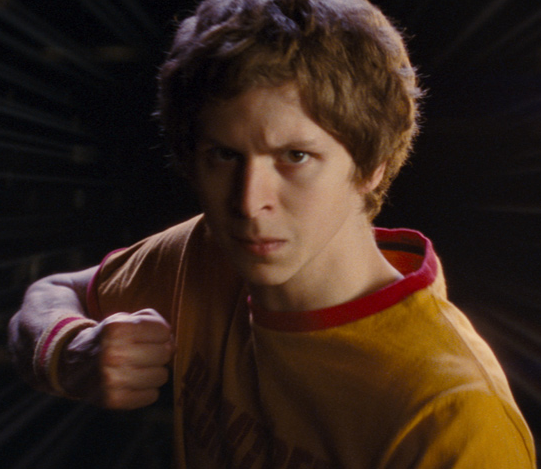
I can't believe Edgar Wright's
Scott Pilgrim vs. the World [2010] did not gain traction with mass audiences when it was released in theaters early this year, because here is an inspired, almost-original take on a comics story that manages to sustain much of its awesomeness in the avalanche of gimmicks and cutesy it tries to drown itself in. What happened? I have a theory about its unforgivable flaw, but that's for later. Let me concentrate on its strengths first, notably Michael Cera in the full power of his trademark nerdy pose equipped with his trademark deadpan line-delivery, surrounded by a world that takes its visual cue from the vocabulary and tropes of video games and comic books. In this film, Mr. Cera plays the embattled title character, a bass guitarist in a struggling band who suddenly becomes besotted with a girl named Ramona Flowers, much to the consternation of a new 17-year old (and in high school) girlfriend named Knives Chau, as well as to the dismay of the rest of his very colorful posse. In pursuit of Ramona, Scott Pilgrim inexplicably finds himself having to fight for the blossoming romance by having to duel to the death with her seven "evil exes" -- a motley crew of inspired lunacy that includes Chris Evans, Brandon Routh, and Jason Schwartzman. Pretty impressive. I enjoyed the film very much, but I felt unimpressed by Mary Elizabeth Winstead's Ramona -- which is crucial. As the film's resident Helen of Troy, for whom deadly battles must be fought over, she comes off -- beyond the almost requisite quirkiness demanded by the role -- as totally undeserving of all that attention. She lacked charm and spark and gravity, the way Zooey Deschanel or Emma Stone might have provided if they had this role. Because no matter how much I wanted to cheer on Scott Pilgrim in his entertaining battles, I found myself scarcely caring for his ultimate goal.
Labels: comics, film
[0] This is Where You Bite the Sandwich

 7:42 PM |
Desire, Memory, and the Blank Slate
7:42 PM |
Desire, Memory, and the Blank Slate
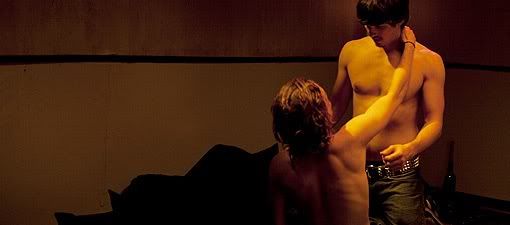
What a pleasant surprise this is. Here is a queer film that defies its niche, dodges the predictable, and becomes a lingering testament about the search for connection in this confusing maze of a world. When I first began viewing Joseph Graham's
Strapped [2010], I was ready to dismiss it as one of those mindless gay films that serves more as a flesh buffet without paying much attention to story, to character, to insight about the human condition. We've all seen pictures seemingly like this, and they've all been fruitless exercises in gay excess for the most part.
Strapped centers, after all, on an unnamed male hustler (played to perfection by the incandescent and boyish Ben Bonenfant) who follows a trick to his apartment complex, and then after the tryst, spends the rest of the night trying to get out of the maze of a building. Unfortunately, the building does not seem to want him to get out -- its ghostly corridors and confusing dead-ends conspire to keep him trapped. In his wanderings, he meets assorted characters, all gay, who sort out their emotional baggage and personal histories or demons as they transact the fact of their lives with their hustling money. The premise sounds like it was made for a porn movie, but this is the surprising magic of Mr. Graham's directorial debut: it favors an intimacy with each character's story over the sexual entanglement. It becomes a tender, knowing, intelligent film that is also edgy and sexual. And so we see individual tales, courtesy of specific tricks, involving memory, fantasy, neediness, homophobia, the evolution of the gay right's movement, and the want for personal connection -- complete with borrowings from Michel Foucault and William Shakespeare. Mr. Bonenfant's triumph as the lead and the connecting thread of the disparate stories is even more amazing considering that he is able to embody, without a single false note, the projections of all the tricks he meets: he is not exactly a cipher -- this is as much his hustler's story as much as the film is about the stories of his tricks -- but he becomes the throbbing and responsive blank slate for the other characters to connect with. When we get to the denouement, it feels right; everything, no matter how disparate the stories were, leads to it. This is a thinking film. That it is also sexy as hell is just an added bonus.
Labels: film, queer
[0] This is Where You Bite the Sandwich

Friday, December 24, 2010
 12:00 PM |
An Unsentimental Christmas
12:00 PM |
An Unsentimental Christmas
When I think about the Christmas that is to come, it hits me each passing day with increasing gravity that I will be spending it alone. I take this with dispassion. It does not matter, I tell myself. And somewhere in the fathoms of me, I smile with a firm nonchalance I’ve taken at this idea of exquisite solitariness surrounded by holiday tinsel and cheer.
Of course, when I mention this to people who ask me where I will be for Christmas Eve, I get a look of passing pity, and I know exactly what they are thinking: the holidays are designed for rituals of gathering, and I am the oddball that elicits—what? Pity? Suspicion? I do my best to allay their misgivings. “The thing is, my mother is in Los Angeles,” I tell them, “This will be my first Christmas without her—and I doubt I shall be sharing noche buena with the others in my family.”
(My second Christmas, actually. Years ago, when I knew no better, I spent a solitary Christmas in the dark snowy nighttime of Hokkaido in Japan, where there was no Christmas—and there, at the approach of midnight, in the silence that begat only more silence, I cried myself to sleep. How amusing that young man seems to me now, so brittle with worry and want.)

So yes, I tell them that my mother is somewhere in the sunny wonderland of Los Angeles. When we—the family, which means all my married brothers and their families and I—would gather for
noche buena on the twenty-fourth of each December, it was a familial exercise we did for her. She demanded it. But we are such an unsentimental family in many ways. All of us have flown the nest, and to assuage our guilt of having donned so much of Western traditions in the habits of family, we would march to Mother’s place in Bantayan, go through the motions of staying, eat her feast, and before the fireworks threatened to make the highways impassable with noise and smoke and the smell of burnt sulfur, we would kiss her goodbye and goodnight, and off we would go to our individual lives. We don’t do gifts. I don’t remember anybody in my family ever giving me, or each other, Christmas gifts as a matter of course. We give gifts randomly throughout the year, but as a Christmas tradition, no. I do remember one time my brother Edwin buying me a computer, when I was a kid. I do remember making my sister-in-law Daisy a mixed tape once, a recording of Meryl Streep reading
The Velveteen Rabbit. I do remember the occasional
manito/manita, but it was never set as a rule or tradition. This has been my kind of Christmas for years. Quite unsentimental, which has taught me well. Of course, we make an effort to sweeten it with Christmas songs and decorations and a good feast, perhaps even snapshot opportunities with smiling faces, but…
“But surely,” they will continue, “you’re spending the holidays with others in your family.”
“Well, my brothers are everywhere, some place else. Switzerland. There are two in Los Angeles. The ones in Dumaguete—they have their own families to share this Christmas with.” Without the fulcrum that is my mother, it feels remarkably odd to even consider.
“Cousins?”
“I don’t want to bother them.”
“Oh my.”
“It’s all right, really.”
I don’t blame them their worry. I know where it comes from. I’ve been there. Some of my best memories of Christmas involve a halo-halo of family and friends and the magic that sometimes happen when you put together people who truly care for each other in a room or a house. Some accidental merriment is bound to ensue. One time, it was my eldest brother Rocky, fresh from Cebu, deciding to shower us kids those gold 25 centavo coins, all shining and newly-minted. We raised such merry ruckus, all that laughter and elbowing and everything else. Another time, my brother Edwin took all of us on a trek to a department store downtown, and told us: “Choose the best Christmas tree in the store, the one you want.” The merchandise was made of plastic, of course, but it was our first Christmas tree after years and years of poverty—and its huge size and its possibilities for decoration overwhelmed us. We brought the tree home to our old house in Sibulan, decked it with ornaments and light. When it finally twinkled, we gathered around it, like it was a beacon of so much hope.
I was a kid in most of these memories. But Christmas is different when you’re young. It has an inner, throbbing magic for children. When we grow up, we are forever exiled from it, possessed only with the inescapable feeling that Christmasses past were always better, shinier. The things we have left are our nostalgia.
Nostalgia will not be in the cards for me this year. I stake my claim on that alone-ness, that beautiful solitariness. But I don’t mean to make it sound sad: the word “alone” carries with it a universe of ennui—and there’s massive literature out there that has mapped out the word to contain our endless capacities for the morose and the dramatic—and so perhaps the right phrase to use may be “spending it by my lonesome.” In either case, the number is singular. And I shall take that fact with an embrace.
It is a beautiful thing to embrace. It has taught me quiet. It has taught me to appreciate the rare moments of togetherness when they do happen out of the kinetic order of the world, and not out of habit or force. It has taught me to pray. I shall thank my unsentimental family for all that. In a sense, this is the best Christmas gift they’ve ever given me.
Labels: family, holidays
[1] This is Where You Bite the Sandwich

Thursday, December 23, 2010
 3:21 PM |
You Die for Your Art
3:21 PM |
You Die for Your Art
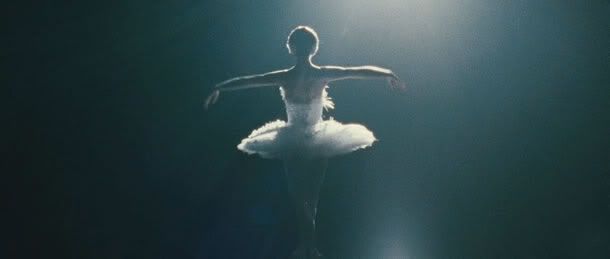
If there is a thread we can pounce on with the body of work of filmmaker Darren Aronofsky, it may be this: you die, or at least suffer, for your art or your ideal. That was immediately apparent when I first saw
π [
Pi, 1998] years and years ago.
Pi was about an obsessive number theorist named Max Cohen (Sean Gullette) who struggles to understand the string of numbers hidden in the Torah and with a mysterious 216-digit number his computer not-so-randomly spat out one day. Later on, we see Max's cinematic cousins in Ellen Burstyn's Sara Goldfarb who struggles to fit into an old red dress with the use of amphetamines in
Requiem for a Dream [2000], Hugh Jackman's Tommy who struggles to find a cure for his wife's brain tumor in
The Fountain [2006], and Mickey Rourke's Robin Ramzinski who struggles with an ailing heart to win one last match in
The Wrestler [2008].
Now, in the terrific and terrifying
Black Swan [2010], Aronofsky unveils his new obsessive in Natalie Portman's Nina Sayer, a ballet dancer known for perfect technique but not for raw uninhibition needed to truly achieve riveting dance. She begins to lose her mind, in a living nightmare reminiscent of Roman Polanski's
Repulsion [1965], as she struggles to lose her straight-laced constraints to truly become the titular ballet role. Her perfection -- dull and unseductive -- slowly cracks.
Mr. Aronofsky knows. He knows the terrible beauty and the exacting nature of artistry or the search for that perfection or ideal. In his previous films, however, one does not get a close-enough cinematic depiction of the need -- or the hunger -- to achieve that artistic ideal. In
Black Swan, he finally does. Take note of that transformation scene when Nina finally breathes in her terrible achievement: she glows and menaces and walks around the backstage like a predator in ecstasy. I recognized that walk, that breathing, that deadly seduction set in the eyes. I told myself, that's it -- that's the familiar high we get when we are in the very depths of the artistic zone. Mr. Aronofsky perfectly renders it. Which is why I love this film. It is not subtle, and does not aim to be -- and so one should not fault it for being the visceral assault that it is. It perfectly captures that throbbing sensuality of having to surrender, little by little, all that we are in the service of our art. And if we have to die for it, we do so with the comfort of knowing we have created something immortal in the process, the applause we get becoming a mere trifle in the exquisite bloodletting it requires.
Labels: dance, film
[0] This is Where You Bite the Sandwich

 11:35 AM |
You Are Not Who You Are
11:35 AM |
You Are Not Who You Are

This is the
other Facebook movie, the perfect bookend to David Fincher's
The Social Network [2010], the slow-burning but incredibly delicious film that has become this year's uncanny mirror of the zeitgeist. (Most of us do live on Facebook now, right?) But while Fincher's film is an intelligent myth-making re-imagination of Facebook's troubled start-up, ostensibly recreating the days of Mark Zuckerberg's life as he deals with the assorted drama of Facebook's creation, Henry Joost and Ariel Shulman's
Catfish [2010] depicts the real-life repercussions of our online interactions. The documentary follows Nev, Mr. Schulman's brother. Nev is a New York photographer who covers the dance world, and one day he receives a painting of one of his dance photographs by a girl named Abby from a little Michigan town. A friendship takes root and soon comes to involve Abby's family -- a mother named Angela, a father named Vince, a brother, Abby's friends, and finally, a beautiful half-sister named Megan, a veterinarian who models, paints, sings, and plays the piano. Online romance ensues. And then soon after, already smitten like a boy in a long-distance love affair, Nev starts discovering that some things ... just don't add up.
The film does start off as a kind of Facebook thriller (complemented by much use of YouTube, Gmail, GoogleMaps, iPhones, Google Earth, and the assorted online applications that have come to define our daily lives). But it ends with such quiet
and devastating drama about alienation and hope, artistic manipulation, the allure of storytelling, and the slippery boundaries of identity that we use to navigate the unguarded highways of the Internet. This reminds me of a post that I blogged (with a subsequent shorter 140-character version in Twitter) a few days ago : "Sometimes when I look at my own Facebook posts and pictures and videos and stuff, I cannot help but feel a little envy for the life that this online persona, this electronic version of me, seems to have. And of course I feel weird feeling that." It's weird because the Ian Rosales Casocot online, in Facebook and elsewhere, is indeed "me" -- and those are my thoughts, my photos, my videos, my life. And yet, I am also aware that in many ways, what I am "creating" online is a persona a little removed from me -- it's the concentration of the best of who I am, the face I want to present to the world, having edited out the humdrum minutes where I just stare off into space, waiting for something to happen. It is from this acknowledgment of how we live our present-day reality that the film manages to appeal to me.
This is happening. And then there is also the film's quiet conclusion, its statement about artists. It broke my heart, and angered me a bit -- but I also found a capacity for empathy. And when we finally get to the part about the catfish of the title, everything else that comes before it makes so much sense.
But of course the film did not make sense for a lot of people who came to screenings of
Catfish and expected a twisty thriller in the vein of M. Night Shyamalan. Reading ordinary moviegoers' comments online about the film (or its trailer) is another reason why I have a certain urge to puke over the notion of "the wisdom of the masses," the same mass of herd-thinking people whose idea of enlightenment is the dumbing explosions of
Transformers and the saccharine inanities of
Twilight. The following comment, from somebody named jocybum* in YouTube, is typical of the many online posts that have been coming out: "I just watched this last night, I was so unbelievably bored and disappointed by what happens after driving to the barn scene. It was so predictable. Plus the fact that they called it a documentary and some people believe this is lolworthy" [unedited].
I look at that, and I feel pity. They don't get it. Most people will not get this movie, and it's sad. It reminds me of what the film critic Roger Ebert once wrote about similar people in his review of Stanley Kubrick’s
2001: A Space Odyssey [1968]: “Man is a curious animal. He is uneasy in the face of great experiences, and if he is forced to experience something profound, he starts immediately to cheapen it, to bring it down to his own level.”
* A quick look at jocybum's YouTube profile shows that he or she is 21, from the United Kingdom, and likes the following videos: "Father Christmas Fucked My Pussy (Christmas Pussy Song)," "He Bite Me in My Vagina," and "Fart Trek: The Next Flatulation." I rest my case.Labels: facebook, film, issues, web and tech
[1] This is Where You Bite the Sandwich

Tuesday, December 21, 2010
 10:45 AM |
Winona Forever
10:45 AM |
Winona Forever
 GQ
GQ's Alex Pappademas goes into speculative mode in his great profile on Winona Ryder, answering this question:
What if the actress never got arrested for shoplifting and never took those pills?Imagine a parallel universe where there is not this Winona-shaped hole in recent cool-movie history. She'd have been one of the Dylans in Todd Haynes's I'm Not There, for sure. Maybe the object of Jim Carrey's amnesia in Eternal Sunshine of the Spotless Mind. She could have been a Tenenbaum.* Maybe even a Cullen.
* Yes, Wes Anderson shot The Royal Tenenbaums before her arrest. But let's say, in this parallel universe, Winona doesn't drop out of Godfather III, which creates a butterfly-effect ripple across the space-time continuum: Sofia Coppola doesn't replace her, which means Sofia Coppola's performance isn't eviscerated by the press, which means she continues to act instead of pursuing a career behind the camera, and the adaptation of Jeffrey Eugenides's novel The Virgin Suicides falls to a fresh-off-Rushmore Wes Anderson, delaying Tenenbaums by two years. Winona plays Margot, obviously. During the film's opening weekend, syndicated radio personality Glenn Beck is mauled by a tiger.
Funny. (Especially the last sentence.)
Read more
here.
I miss Winona Ryder. That girl had subtlety. Take note of her May Welland in Martin Scorsese's
The Age of Innocence: so sweet and caring ... and manipulative. Please bring her back, Hollywood.
Labels: celebrity, film, magazines
[1] This is Where You Bite the Sandwich

Monday, December 20, 2010
 2:05 AM |
It's All About Sex
2:05 AM |
It's All About Sex
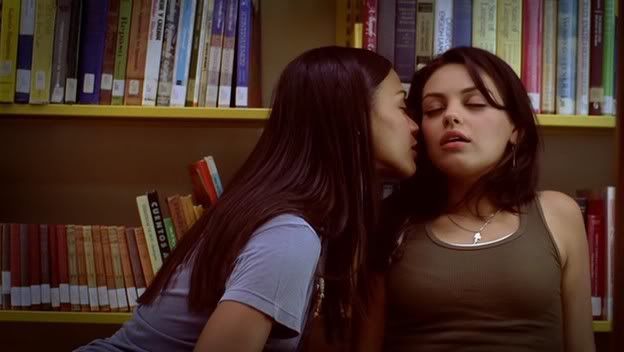
What do we ultimately get after watching Eric Amadio’s
After Sex [2007]? Nothing, except the creeping feeling that we just lost a huge chunk of our time. This pretentious film about twosomes of all kinds having assorted intimate conversations after coupling is really just a string of vignettes that have no organic whole except that they try to explore issues of sex and sexuality and their permutations — a gay couple talk about roles and role-playing, a straight couple talk about the vagaries of loving, a Latino lady killer frets about having bedded a call girl, et cetera — but not much is new here. The insights are not insights but cliches, and almost all of the vignettes are delivered in such hokey ways by actors (save for the wonderful Zoe Saldana as a lesbian in love with her feelings-phobic roommate) who are straining way beyond their depths here. This is a cheesy and ineffectual film for people who think they can gain wisdom from reading the text on a milk carton.
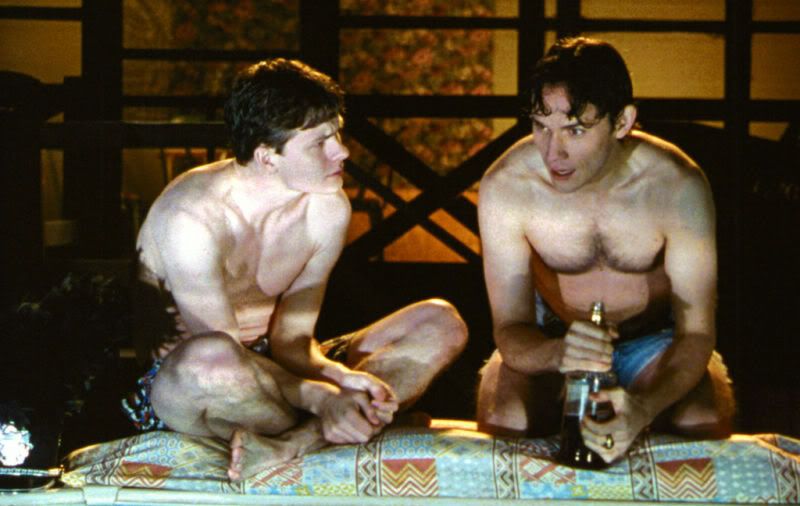
Tom Donaghy’s
The Story of a Bad Boy [1999] is a quirky — idiosyncratic? — story of a 17-year old high school boy in the closet who goes through the tumultuous cycles of life in senior year while juggling all sorts of extra-curricular activities, well-meaning but hopelessly clueless parents, and a developing crush on a student teacher. Played mostly in comic broad strokes, it nevertheless manages to convey the seriously funny and seriously mind-boggling roller coaster ride that is being 17. Every single scene here is done in hyperbole, but by God, I recognized the undercurrents. It certainly brought me back. This is a strange way of doing a film with the issues it tries to flesh out, but it works in some strange way. Even the puzzling end seems appropriate — although I don’t know what it is all about. But why fuss about that making absolutely no sense? I’ve been 17. It didn’t make sense either.
Labels: film, queer
[0] This is Where You Bite the Sandwich

Sunday, December 19, 2010
 7:25 PM |
Life in Dissociative Mode
7:25 PM |
Life in Dissociative Mode
Sometimes when I look at my own Facebook posts and pictures and videos and stuff, I cannot help but feel a little envy for the life that this online persona, this electronic version of me, seems to have. And of course I feel weird feeling that.Labels: facebook, life, web and tech
[0] This is Where You Bite the Sandwich

 4:15 PM |
Through the Rabbit Hole Into Wonderland at the Foot of Pundaquit
4:15 PM |
Through the Rabbit Hole Into Wonderland at the Foot of Pundaquit
I decided to spend a week in Manila right after arriving from the United States, not just to fulfill some last obligations for the U.S. Embassy but also to visit some friends, and to prepare myself for the eventual arrival home in Dumaguete City. The essayists Rica Bolipata-Santos decided to take me, along with writers Francesca Kwe-Lacaba and Kris Lanot Lacaba, for a weekend in Casa San Miguel in Zambales, at the foot of Mt. Pundaquit.
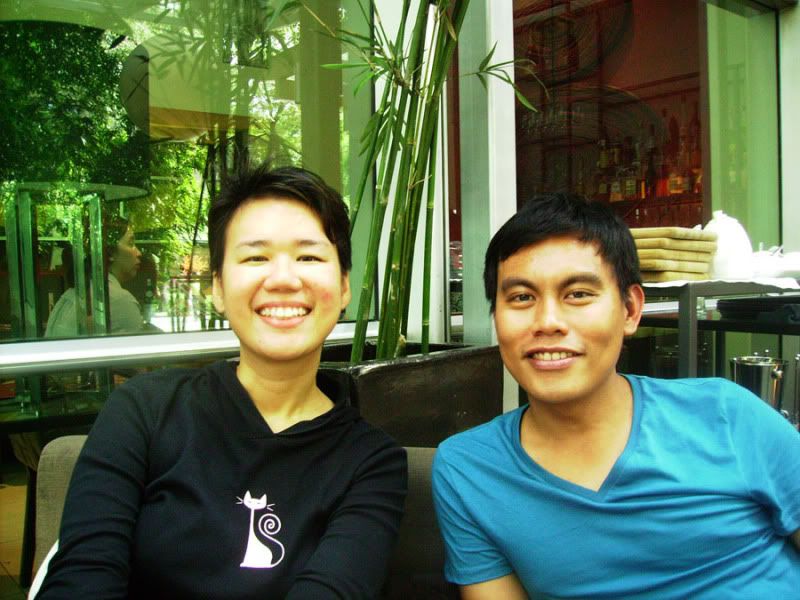
With horror writer Yvette Tan at M Cafe in Greenbelt.
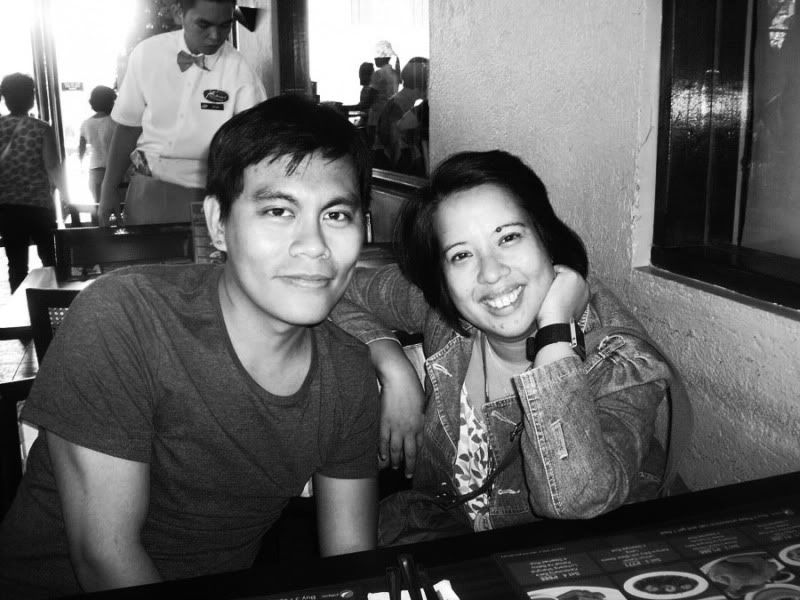
With essayist Rica Bolipata-Santos in Subic for lunch, on our way to Casa San Miguel in Zambales.
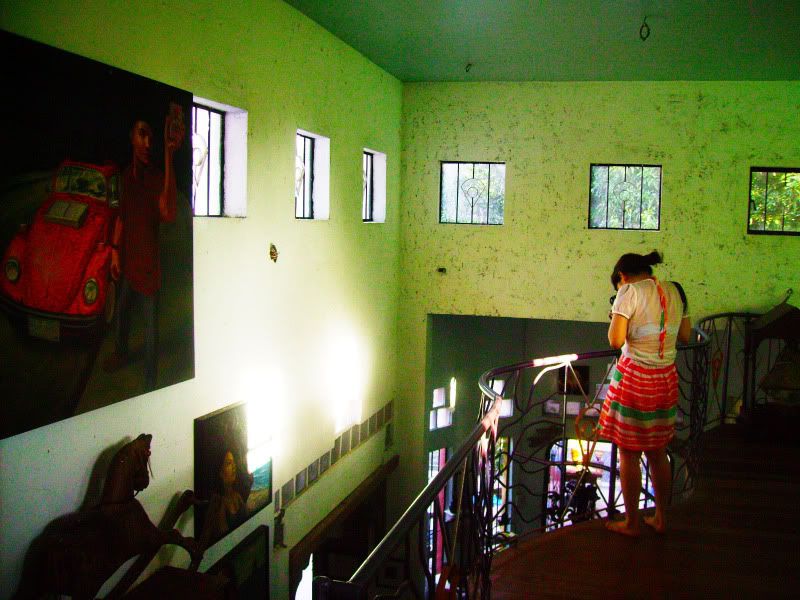
The fiction writer Francesca Kwe-Lacaba taking in the visual overload of Plet Bolipata-Borlongan and Emong Borlongan's house and studio in Casa San Miguel in Zambales.
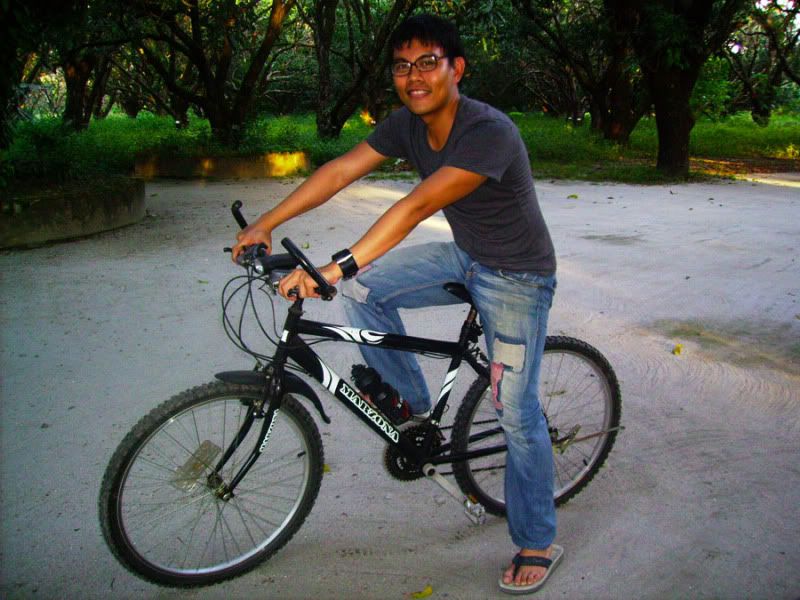
I rediscovered childhood biking around Casa San Miguel.
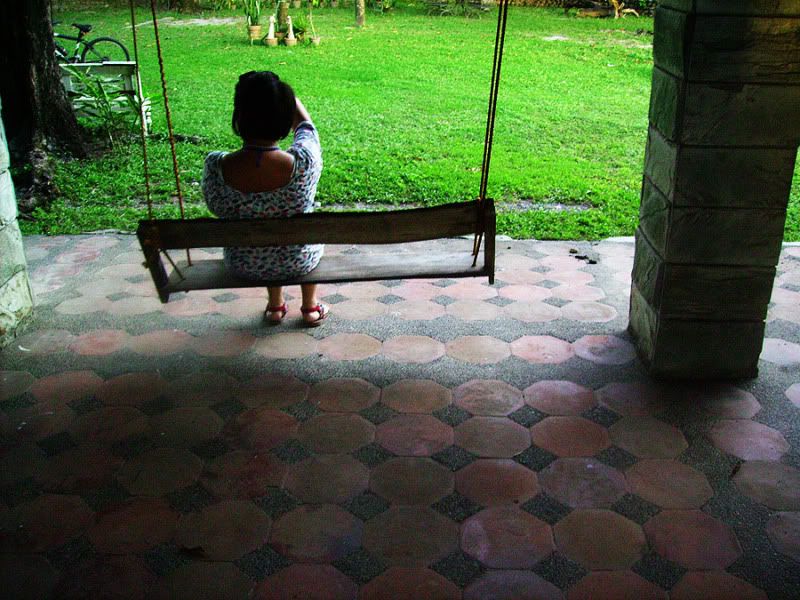
Rica Bolipata-Santos in contemplative mood in her house in Zambales.

Around Casa San Miguel...
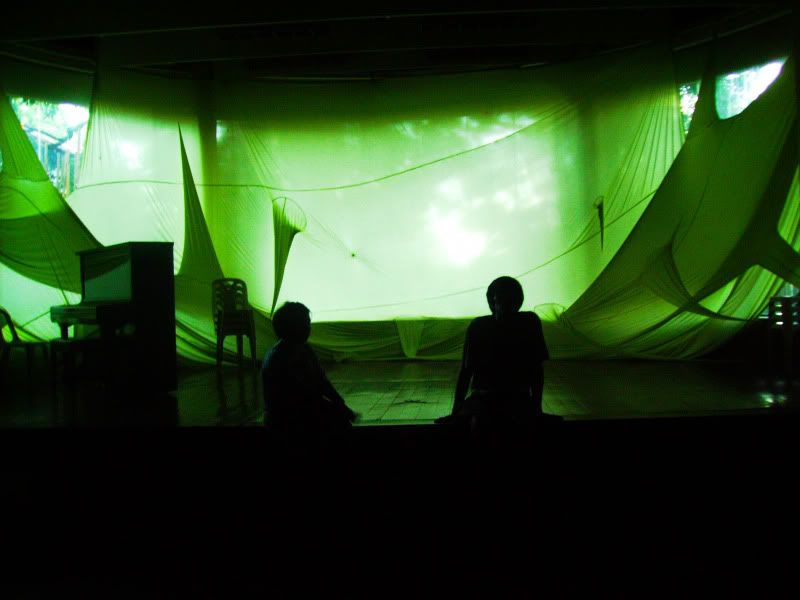
Rica and poet Kris Lanot Lacaba in the green shadows of the stage in Casa San Miguel.

Kris and Kit celebrated their first wedding anniversary with us in Casa San Miguel...
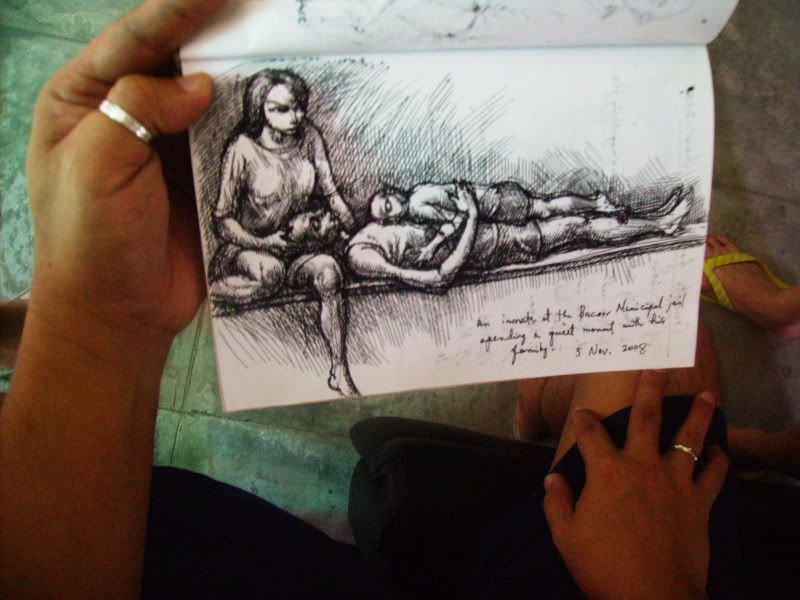
Emong Borlongan shows us his sketch notebook...
Spending a lazy weekend with friends and writing can be a beautiful thing. One truly needs this once in a while.
Labels: art and culture, friends, photography, travel, writers
[0] This is Where You Bite the Sandwich

Wednesday, December 15, 2010
 11:18 PM |
One Afternoon in Cafe Antonio
11:18 PM |
One Afternoon in Cafe Antonio
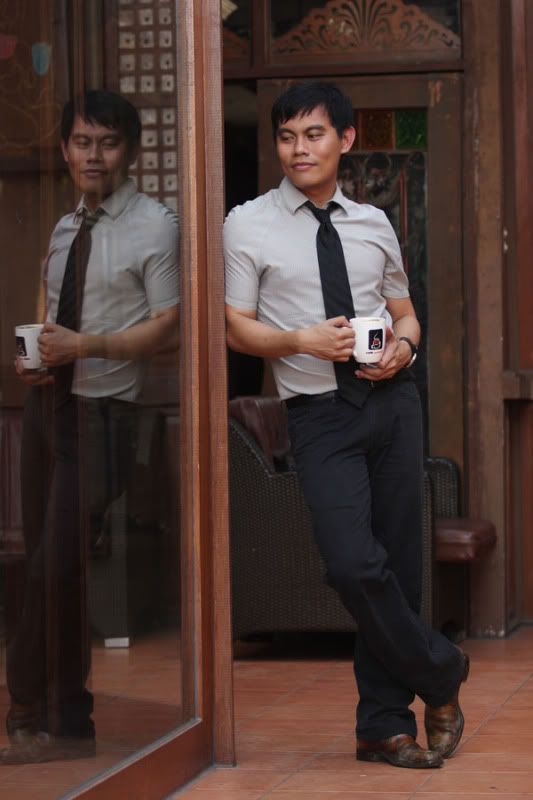
This is a hopeful attempt to update some really dated cached pictures of myself in Google Images. My name is Ian Rosales Casocot, and this is me in Cafe Antonio, in Dumaguete City, December 2010. Photo by the brilliant visual artist Hersley Ven Casero.
Labels: dumaguete, life, photography
[0] This is Where You Bite the Sandwich

 10:22 AM |
Here's to Memorable Fictional Characters
10:22 AM |
Here's to Memorable Fictional Characters
I never usually respond to Facebook meme lists like this: "Fifteen ____ in Fifteen Minutes." (Fill in the blanks. Your favorite films, music, books, et cetera in the tight span of fifteen minutes.) I find this endeavor to be a perfect waste of time and energy, and I know I will not be so truthful anyway -- how do I know
for sure the films or books or music that define my life and put them down without much thinking in fifteen minutes? I always agonize even when I'm asked casually what my favorite film or book is. And yet, how come I responded so willingly to Anna's call this morning for fifteen memorable fictional characters in fifteen minutes? Perhaps because at that very moment, I was thinking of the boy Charlie from Steve Chbosky's "The Perks of Being a Wallflower," and marveled at how precocious and sensitive he was, how I felt for him -- how he seemed real even on the page. And so, the one below became my list. And I couldn't stop at fifteen. I had to go for an even thirty. Memorable fictional characters in films, television shows, books, comics, plays, and songs that have stayed with me, for some reason or other...
Holden Caulfield in J.D. Salinger's "The Catcher in the Rye"
Craig in Craig Thompson's "Blankets"
Philip Benjamin in David Leavitt's "The Lost Language of Cranes"
Giovanni in James Baldwin's "Giovanni's Room"
Elliot in Steven Spielberg's "E.T. The Extra-Terrestrial"
Charlie in Stephen Chbosky's "The Perks of Being a Wallflower"
Zach in Jonah Markowitz's "Shelter"
Doña Lupe in Nick Joaquin's "The Summer Solstice"
Setsuko in Isao Takahata's "Grave of the Fireflies"
Tom Ripley in Anthony Minghella's film of Patricia Highsmith's "The Talented Mr. Ripley"
Junior in Lino Brocka's "Tinimbang Ka Ngunit Kulang"
Steve Dunne in Cameron Crowe's "Singles"
Ariel in Ron Clements and John Musker's "The Little Mermaid"
Prof. Grady Tripp in Curtis Hanson's film of Michael Chabon's "Wonder Boys"
Tintin in Georges Rémi's "The Adventures of Tintin, Boy Reporter"
Antonio in Joselito Altarejos's "Ang Lihim ni Antonio"
Dorothy Boyd in Cameron Crowe's "Jerry Maguire"
Jacinta Cordova in Dean Francis Alfar's "Salamanca"
Justin Taylor in Ron Cowen and Daniel Lipman's "Queer as Folk"
Melchior Gabor in Duncan Sheik and Steven Sater's "Spring Awakening"
Regina George in Mark Waters's "Mean Girls"
Carrie Bradshaw in HBO's adaptation of Candace Bushnell's "Sex and the City"
John Keating in Peter Weir's "Dead Poets Society"
Ading in Manuel Arguilla's "Midsummer"
Kiki in Hayao Miyazaki's "Kiki's Delivery Service"
Jude in The Beatles' "Hey, Jude"
Grace Coddington in R.J. Cutler's "The September Issue"
Will Truman in David Kohan and Max Mutchnick's "Will & Grace"
Eva Peron in Andrew Lloyd Webber and Tim Rice's "Evita"
Francesca Johnson in Clint Eastwood's film of Robert James Waller's "The Bridges of Madison County"
Labels: books, comics, fiction, film, memes, music, television, theater
[0] This is Where You Bite the Sandwich

Tuesday, December 14, 2010
 6:00 AM |
With Movies This Bad, I Might as Well Go Straight
6:00 AM |
With Movies This Bad, I Might as Well Go Straight
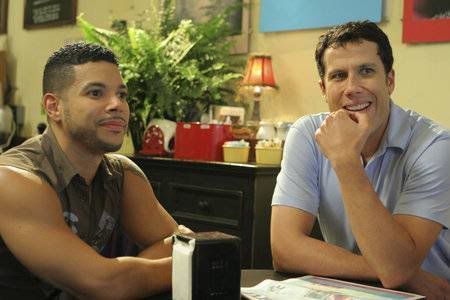
If you have been wondering, you might as well know by now that I’ve been watching all these queer films for research on an article about gay films that I am writing — and for the most part, I’ve enjoyed the assignment, having discovered obscure (and mostly foreign) gems along the way, films that never got into my cinematic radar before. (And for obvious reasons.) But lately, there has been this string of real time-wasters. Stewart Wade’s
Coffee Date [2006]. Lawrence Ferber’s
Birthday Time [2000]. Rob Williams’
Long Term Relationship [2006]. Jeff London’s
And Then Came Summer [2000]. Bad, bad, bad movies. Such inept filmmaking, they don’t even deserve the cringe they induce.
Labels: film, queer
[2] This is Where You Bite the Sandwich

 4:41 AM |
Solidarity in Literature Without Borders
4:41 AM |
Solidarity in Literature Without Borders
By Simeon Dumdum Jr.
I had planned to write the keynote speech last week and for the purpose made sure to clear my table of business. But when I was about to begin writing, the clerk reminded me of a decision to be promulgated in a day or two—a murder case inherited from another judge. This meant going over the transcript of stenographic notes and piecing the story together from the narration of witnesses. The trouble was, there were missing transcripts and the stenographer who made them was equally missing.
Clearly, as between the murder case and the keynote speech, the former had the precedence. And so I set aside everything else and riffled through the finger-smudged pages of the case record. I hoped to finish the decision before the PEN Conference. Because I did not hear the case myself and there were gaps in the evidence, I took the cue from Sherlock Holmes and used the Science of Deduction, and left the rest to God.
I convicted the accused. To my great surprise, he rejoiced when he heard the verdict and thanked the court for it.
This illustrates the common fate of writers who hold day jobs. Often their writing is pre-empted by work and events. One morning last week, as I entered the courthouse, I saw a little girl, not yet seven. She wore a smart, green dress and held a bright-yellow parasol. She stood beside her mother and peered from the crepuscular interior of the hall of justice at the people who were arriving. I knew who she was waiting for—her father, a detention prisoner, who was coming to court that morning for the hearing of his case. It was an occasion for her and her mother to link up with him.
When I saw the girl, I asked myself—did it matter to her and the other children waiting for their parents who were accused and detained for this or that crime that I wrote poems and essays, and spent hours trying to perfect every piece? Indeed, does writing—or literature, if you wish—matter at all?
The question has been asked many times before, and as many times answered. In other words, it has naturally evolved into a non-question. Of course, literature matters, or else the literature department of the British Council would not use this as name for its newsletter. But to that little girl in the green dress and with a yellow umbrella nothing matters more than the proximity of her father, and ultimately the handing out of justice that would clear him, for every daughter believes in her father’s innocence. And father and daughter would be together again, and he would be back to work, and she to school and the nights and days would no longer be as anxious and troubled.
Is not that what writing, deep down, seeks, that it should matter? The refinement of the spirit that results from all good, true writing yearns for the peace that thrives in fairness and dignity, which even the haiku presumes in its juxtaposition of images from the natural world.
Last year, someone on Facebook made a call for a hundred poems about Maguindanao to protest the massacre on November 23, 2009, of 58 people, a good number of them journalists. Many responded to the call and in no time the poems exceeded the limit, prompting the coordinator to declare the submissions ended. I was among those who participated with this piece:
Maguindanao
What have I learned about Maguindanao?
It seems a place I’ll never get to know
Except in stories—images that flow
In the imagination, or that plow
It, because they can turn up and endow
The mind with fresh furrows that gape as though
They were a series of wounds a big hoe
Had cut across the hill’s capacious brow.
But what I know of childhood, be it brief,
And love, they have them in Maguindanao,
But it can happen that something robs us
Of these, and life, and what I know of grief,
That something may again be here, that now
Splinters speech into syllables and sobs.
I had no illusions about what the sonnet could do, but I knew that my voice would join the voices of many others and all our voices together would become one and grow in volume and intensity and be impossible to ignore.
I found it significant that overall the poems, though not deficient in their expressions of grief, were not strident, and were irenic, seeking beyond the punishment of the killers the inauguration of a prelapsarian Maguindanao, a land of friendship, fair-dealing and tolerance.
Somehow what the local poets did was in line with what the PEN Charter calls upon its members to do on a global scale: “Members of PEN should at all times use what influence they have in favour of good understanding and mutual respect among nations; they pledge themselves to do their utmost to dispel race, class and national hatreds and to champion the ideal of one humanity living in peace in the world.”
Writing seeks not so much the just word, as justice, and this justice is not merely a justice that punishes but more significantly a justice that restores—both the removal of discrimination and hatred and the healing of wounds caused by them.
Before that healing can come about collectively, it must happen to the writers individually. In himself, the writer must be whole. By all means, he must find healing through and by reason of his writing.
When asked what he thought of a writer who beat up his wife, John Gardner replied that the writer was a better person when he was writing than when he was hitting his spouse. If that writer were to write a romantic novel, I most certainly would not read it—I would not like to risk having mental constipation.
I remember submitting a poem by the late Cebuano writer Temistocles Adlawan to a literary magazine. The poem was a monologue, the monologue of a wife berating her husband. After almost a page-long, verbal abuse, the wife stopped. But the poem did not stop. It continued with a last line, a postscript—the husband floored the wife with a left hook. For some reason, the editor of the magazine, a lady, rejected the poem.
Wholeness is mainly of the heart—the healing is mostly inner, spiritual. But I myself have experienced how writing helped in my physical healing.
Early last year, I was found to have cancer and underwent surgery. After that I had chemotherapy for six months. My wife Gingging, whose presence here I acknowledge, and who never left my side, told me that, before we left his clinic, the doctor advised her to keep me busy during the months of treatment.
I know why the doctor gave her that advice. Thoughts are the enemies of one in my situation then, and, more than the medicine that devastates both the malignant and healthy cells, these thoughts can enervate the patient. They are an invitation either to have faith or despair. I chose to have faith and to pray. The wife must have been wondering what to give me to keep me occupied, as the doctor suggested. But before she could think of anything specific, such as Sudoku, I remembered a project that I began years ago, a collection of poems about birds using different verse forms. I had written about 15 birds so far. Using a reference book I had borrowed and had failed to return before the owner lost his memory, I resumed writing, two birds and two verse forms a day, one in the morning, one in the afternoon. When I reached a hundred birds I decided to stop. I felt I had enough for a collection. But when I checked the bird list, I realized that I had left out 29 species. They seemed to plead with me to include them. I yielded out of pity. When the six-month period of treatment ended, I had completed the project—129 birds and 131 verse forms in all. I gave the collection the title, “If I Write You This Poem, Will You Make It Fly?”
When I reflect on our convention theme, “Solidarity in Literature without Borders,” especially on the phrase “without borders,” I think of birds. For me they exemplify what it means to live without borders.
Of the more than 600 bird species found in the Philippines, about 400 are migratory, such as the egrets, sandpipers, terns, plovers. They generally arrive in the country in September and depart in April.
Sometimes I imagine a poet from the country where these birds come from banding the leg of, say, a Gray Plover, and inserting inside the band a sijo, ghazal, luc-bat or copla de arte mayor, whatever might be the peculiar verse form of that country. And if that plover chooses to winter out on the shores of Talisay in Cebu, where we live, I might replace the sijo with an ambahan or tanaga for the bird to take with it when it flies back in April to its country of origin. The unknown other poet and myself will have established a sort of solidarity between us, and as far as we’re concerned writing knows no borders.
Of course, that solidarity and that borderlessness now take on more sophisticated forms, consistent with advances in technology. But the basic things remain—our commitment as writers to justice and compassion, and the rest of the virtues that advance the causes that dignify and fulfil the human race.
To sum up, writers and birds should not be put inside cages, whether territorial or political. Perhaps we do not know that birds are likewise members of PEN, the reason why they too have quills.
To end this rambling keynote speech, let me read the last poem of the collection, a sestina, which I dedicate to the respected and loved National Artist, Dr. Edith Tiempo, who would have been here giving the keynote speech instead of me if only she had stronger wings:
Sestina
Before I go I’ll mention six rare birds,
And I know there are more that have been blessed
To survive, but now hardly ever soar
To fill our early evenings with their singing,
Many of us would want to see them fly
So much we would throw caution to the winds.
Such as the Philippine Eagle that winds
Cannot scare, though they may send the small birds
Scampering for cover, afraid to fly.
The forest canopy is to it blessed
Ground – it seems it prefers silence to singing,
And often takes its time and space to soar.
It occurs to me that were I to soar
On a hot air balloon despite the winds
Blowing from every direction and singing
In my ears, I might spot among the birds
The Wooly-Necked Stork – that would be a blessed
Day, indeed, for me to launch up and fly.
Some saw the Cebu Flowerpecker fly
From a luxuriant bush that seemed to soar
From a cliff, and like a swaying hand blessed
The rice land then being combed by the winds.
They claimed to have spotted a group of birds
Of the species, sitting in pairs and singing.
Sarus Crane, Spot-billed Pelican – non-singing
Birds, now all but extinct and quick to fly –
And Blue-Backed Parrot – in the book of birds
The one that would rather converse than soar,
But untaught it could only speak the wind’s
Tongue, which souls use in the land of the blessed.
When all is said and done, we need this blessed
Thing, compassion – to hear the rare birds singing
Again, those of them that can, and the winds,
I’m sure, will settle down to let them fly,
And once more find the abandon to soar.
Now, I urge not just the rare but all birds,
As birds did when St. Francis had blessed them,
To soar up singing while forming a Cross,
Then fly off to the four winds praising God.
This is the keynote speech at the Philippine PEN Congress on December 4 and 5, 2010, in Cebu City.The author, whose passion is writing poetry and lyrical essays, is at same time an executive judge in Cebu City.Labels: conferences, issues, philippine literature, writers
[1] This is Where You Bite the Sandwich

Sunday, December 12, 2010
 3:43 PM |
Red Letter Day
3:43 PM |
Red Letter Day

It took me quite a while to see Will Gluck's
Easy A [2010]. It wasn't showing locally before I went to the U.S., and I almost got to see it in Coralville in Iowa but I really had no time to spare for what I knew to be Hollywood junkfood cinema. An interesting one, I must say, but still junk. I enjoyed it, but like most critics, I felt it betrayed the spark of its inspiration by being flatfooted and being unsure about where it was going with its story. Which is sad, because it has Emma Stone -- an actress with so much presence and brightness in her she should already be a star -- as the presumed and highly misunderstood high school slut . Plus it has a stellar supporting cast playing such quirky characters. And it has a certain post-modern referential bent (it knows John Hughes! Cameron Crowe! Nathaniel Hawthorne! Mark Twain!) that makes it endearing. But in the end, all that good stuff just don't add up to a good film. But for a lazy Sunday afternoon waiting out the rain while you watch the paint on your new bookshelves dry, it might be good enough to watch.
Labels: film
[0] This is Where You Bite the Sandwich

 1:19 AM |
Vicious Circles
1:19 AM |
Vicious Circles
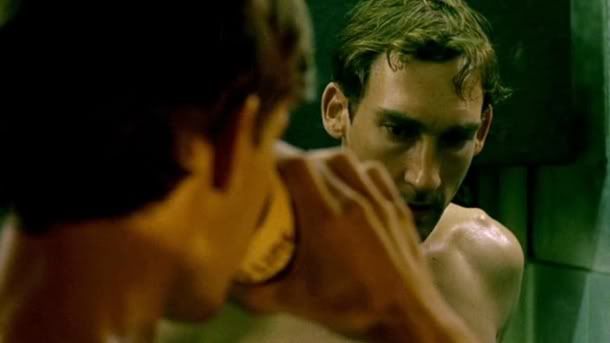
In 2007, the United Kingdom's Channel 4 commissioned a season of appropriate programming to commemorate the 40th anniversary of the British decriminalization of homosexuality. One of the shows that was part of that slate was the TV movie
Clapham Junction, directed and written by Kevin Elyot, which follows the lives of several men and women, most of them gay men, as they intersect each other's lives as they deal with the mundane. And alas, also the not-so-mundane, it turns out: there's gay bashing here, and drugs, and illicit sex, and closeted husbands, and gay marriages, and homophobia, and pedophilia, and murder -- in a sense, a gruesome picture of how ordinary people have the capacity to hurt each other, to cause each other needless misery just because other people are just ... different. The film's treatment of 36 hours in the lives of assorted people (a TV writer, an actress and her moody son, a doctor and his new husband, a waiter, a mailman, among many other) on an extraordinarily hot day in the Clapham district of London reminds me of the character juggle that went on in Robert Altman's
Short Cuts and Paul Haggis'
Crash. It is to Mr. Elyot's credit that he manages to tell a good and absorbing arch of a story composed of so many disparate elements without resorting to the pedantic finger-wagging about issues that would have been the easy way out. I've read some of the reviews of this film, many of them vitriolic in their estimation of this effort as being unoriginal or predictable. I am led to ask this question with such incredulity: were these people watching the same movie that I did? Because this film manages to go beyond the usual in queer cinema -- it shows how, 40 years after the fact of decriminalization, we are still faced with uncommon dangers, perhaps facing more complex troubles in an increasingly complex world. And also because this film said many things with such raw and sad power, and managed to constantly pull the rug from underneath my feet most times I thought I knew what was going to happen. This is such a difficult film to watch, but once you allow the film to wash over you, you are left with a sense of appreciation of what it is trying to do.
Labels: film, issues, queer
[0] This is Where You Bite the Sandwich

Saturday, December 11, 2010
 4:47 PM |
The Detour on the Way to Happiness
4:47 PM |
The Detour on the Way to Happiness
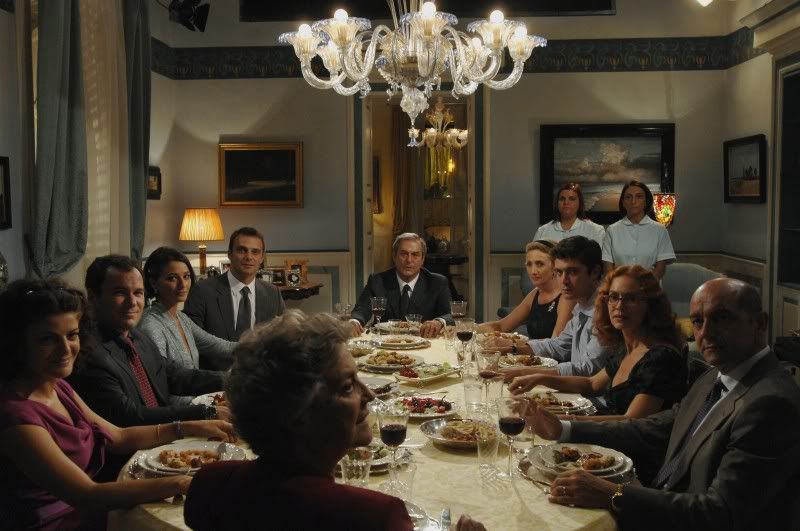
Even when it is in part comic and in part melodramatic -- and does not know whether to be one or the other, a certain bitter truth ultimately emerges from the Italian film
Mine Vaganti [
Loose Cannons, 2010], directed by Ferzan Ozpetek from a screenplay by Ivan Cotroneo. What it has to say is nothing new, but then again, all insights about the human condition have largely been told and retold to death in the wealth of literature that we have and what really gives each one weight is the creative way by which each is told. In this case, we are given the age-old theme about how the pursuit of personal happiness must take precedence over all else, or life will not be worth living. This is bundled into the story of Tomasso, a writer who comes home ready to announce the fact that he is gay, wants to move to the big city for good to live with his lover, and will happily not take part in the family's pasta business -- even at the risk of alienating his family of conservative but quirky individuals. He runs by the plan to his older brother Antonio who has taken charge of the family business, and at the exact moment during family dinner where he plans to make the announcement, something happens that ruins everything he is prepared to do. He soon finds himself retreating to the closet instead, at least where his family is concerned, delaying his dreams of being a novelist to immerse himself, however half-heartedly, into the family business. Over all of these, his wizened grandmother, who has her own secrets to tell, watches from the sidelines and witnesses the struggles of her grandsons with knowing weariness, but she is also all too-ready to seize a particular opportunity she once lost many years before. There are other side stories involving other characters as well, but that's about it. It sounds convoluted -- but this is Italian melodrama with its requisite twists and turns. Suffice it to say that in the end, the loose ends are tied, and everyone gets their happy endings. This is a small film with haphazard ambitions, and given that consideration, it works. This is thanks in large part to a cast that tries to give an old story some gravity: there are individual moments in the film that a certain something gets conveyed with such alarming clarity, without words, just gestures and the slight changes in the movement of the eyes. In the end though, we've been told this story before, and so we end it only affirming what we already know.
Labels: film, queer
[0] This is Where You Bite the Sandwich

Wednesday, December 08, 2010
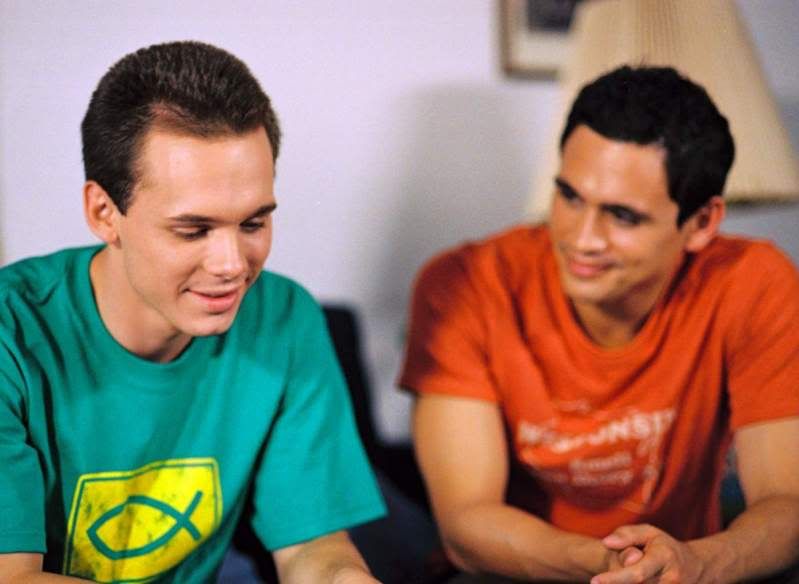
It's not a well-made film, but there's something about the quiet and earnestness of David Lewis's
Rock Haven [2007] that makes it somehow work. Not by much, but you finish it wanting to pat the filmmaker on the back and say, "Nice one, dude." Or something to that effect, which may be a tad patronizing admittedly. But I admire it without liking it very much as a piece of filmmaking. It goes into uncharted territory, after all: this is about a fiercely evangelical boy in a small seaside town who struggles with his newfound sexuality after being introduced to the boy next door. The usual drama ensues, but the film does not exactly lead us to the usual paths in narratives like this, and in fact tries to make complete human beings of all the characters involved, even when the acting often comes off as wooden and caricaturish. Nevertheless. Do I recommend this? Not exactly, but if you have enough time on your hands, this is harmless fluff that feels nice in places, but that's about it.
Labels: film, queer
[0] This is Where You Bite the Sandwich

Tuesday, December 07, 2010
 1:40 PM |
Sweet Confection
1:40 PM |
Sweet Confection
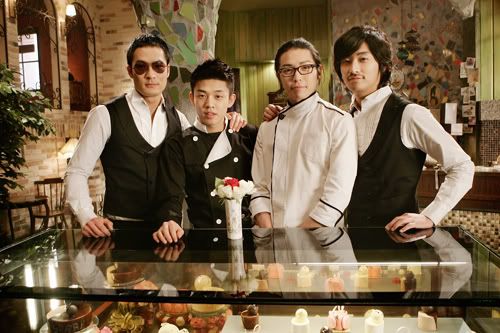
It was quite a relief to stumble onto Kyu-Dong Min's
Antique Bakery [2008], because I was already despairing whether I could find a Korean film that would do some justice to queer characterization in film. This one does not do it -- surprise, surprise -- but what it has saves it from being a total bore. And what does it have? It has an interesting story to tell, and tells it with the come-on of so much great food, all of which are photographed spectacularly you can almost taste them. It also has plenty of charm, so much so that it draws us in into the strange dynamics of four men in an unlikely friendship, all of them connected by the pastry shop they all work for. Based on the popular Japanese manga, it tells us the story of a troubled but easy-going scion of a wealthy family who opens the bakery in question and hires Korea's best pastry chef to work for him. The pastry chef also happens to be a one-time high school classmate who used to have a crush on him, and whose heart he has broken. Into the mix comes an ex-boxer with a sweet tooth and a bumbling bodyguard. Their easy-going camaraderie, their unfolding secrets, and the comic ways with which they deal with each other provide the film's narrative backbone, which is strong enough to withstand the story's strange detour into serial killer procedural territory. Still, even when it does that, the director seems very sure of his material that he is able to juggle so many subplots without faltering, without losing our interest. Perhaps the performances here are what ultimately makes it worthy of viewing: the actors do make their characters believable and emphatic. And who's to decline the invitation of seeing a film with beautiful boys combined with delicious cakes?
Labels: film, queer
[0] This is Where You Bite the Sandwich

 9:28 AM |
This Boy Needs a Barber
9:28 AM |
This Boy Needs a Barber
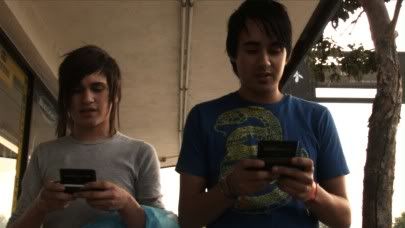
I was not charmed at all by Brian Harris Krinsky's
Dish [2010], a much-praised short film about emo gay kids in a down-and-out Los Angeles neighborhood, dealing with the fact of burgeoning sexuality as they sextext the misadventures of other kids their age. It centers on Israel, a moody 15-year-old with a strange hair fixation who decides to finally lose his virginity after his best friend recounts his latest exploits in bed. What he does (or does not do) in pursuit of that is the film's calculated epiphany, its gamble to make us go oohh-and-ahhh and reflect about such matters as sexuality and technology, the socio-politics of young bodies, the careless nonchalance to stark economic realities that surrounds people of a certain generation. I didn't bite. This film lacks soul. And maybe that's the point, but it did not move me. What can I say, maybe it's the hair.
Labels: film, queer
[0] This is Where You Bite the Sandwich

 9:01 AM |
A Season in Heartbreak
9:01 AM |
A Season in Heartbreak
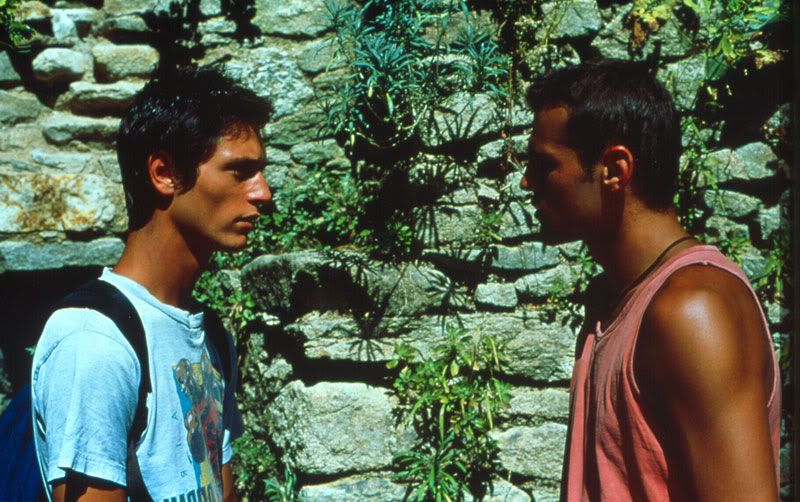
It's not easy to digest the narrative that unspools, like a fraught and fragmented world, in Sébastien Lifshitz's film
Presque Rien [
Come Undone, 2000]. It does not explain much of itself either, and one is left mostly to one's own devices to fill in the blanks that the film generously gives us. Perhaps it's best to note the change in time registers to make sense of the fragmented story: there's the bright summer of discovering passion and then the dull winter of gathering a scattered sense of self -- and between them there is a season of heartbreak set in a hospital where a beautiful 19-year-old languishes in unnamed melancholy. (Why is he here? This is the question we keep asking ourselves till the very end.) That these fragments of time blend into each other in the narrative is an audacious move in Lifshitz's direction, something that precedes the time-bending films of Alejandro González Iñárritu. And if one is patient enough, one gets finally a full story all told in the exact telling of feeling. What the film does give us with a measure of completeness is the summer love affair that blooms and turns to such realistic heat between two teenage boys -- sensitive Mathieu (played by a glorious and subtle Jérémie Elkaïm in a difficult role) and unfocused Cedric (played by Stéphane Rideau) -- in a seaside French town where Mathieu's mother has come to convalesce from a long bout of depression. Then we get snippets of a future reeling from the consequences of that summer. Just snippets, nothing more, and we are left wondering -- what happened? I think this is a story about how, in life, we meet and come to love people, but how we sometimes find that love is never enough. Especially if it's love between people who just belong to two different worlds. We need connection beyond the temporary giddiness of the carnal. I think, in the end, Mathieu finds that, but the movie simply does not give us the luxury of knowing for sure. It challenges us to find out for sure by way of feel. This is the film's weakness, and its strength. I love this film. It is probably one of the most realistic chronicle of falling in love and the devastating aftermath of heartbreak that has ever been set down to celluloid, without the histrionics of the actual heartbreak.
Labels: film, queer
[0] This is Where You Bite the Sandwich

Sunday, December 05, 2010
 7:29 PM |
Friends in a Candid Snapshot
7:29 PM |
Friends in a Candid Snapshot

Candid shots of good friends laughing are always the best kind of personal photography. At Antonio's place, Dumaguete, 4 December 2010.
Labels: dumaguete, friends, photography
[0] This is Where You Bite the Sandwich

 7:21 PM |
A Love Story in Search of Structure
7:21 PM |
A Love Story in Search of Structure

Kim Jo Kwang Su’s
Chingu Sai? [
Just Friends?, 2009] is a very slight short film that never really finds its proper tone. This despite the absolutely winsome performances of the two leads Yeon Woo-Jin (as Min-soo, a soldier in the Korean military) and Lee Je-Hun (as Seok-yi, Min-soo’s civilian boyfriend). Is it a comedy? Or a drama? Or a musical? What does it really want to say? I think it is disaster brought about by a flawed screenplay more than anything else. Writer Min Yong-Keun does not exactly give the story — about two young gay lovers who are discovered in an intimate clinch by the mother of one of them — an appropriate dramatic structure, and instead subjects us to gay cliches and mind-boggling digressions such as the musical numbers in the beginning, middle, and end of the film. The middle part of the film in particular resorts to a badly-written song when an earnest dialogue would have sufficed. I suspect the filmmakers had trouble in articulating in cinematic terms the specific gay condition that needed illuminating at that moment. This is sad, because it is such a disservice to what would have been a good story. Consider also the tearful confrontation between a soldier’s girlfriend and Seok-yi near the end of the film. She tells him a devastating story: she has found out her lover, also in the military, is gay. Then consider Seok-yi’s reply to that — a puzzling admission that I won’t divulge here that has no place at all in the story. Alas, there are also many other pieces in the film that don’t fit, which eventually exasperates. Is there a Korean movie out there that tackles a gay subject matter with an ounce of sensitivity and subtlety? Because so far, the search has been very disappointing.
Labels: film, queer
[0] This is Where You Bite the Sandwich

Thursday, December 02, 2010
 10:54 AM |
Inspiration is Nonsense
10:54 AM |
Inspiration is Nonsense
“I think inspiration is nonsense, actually. Every so often, I mean like one day in twenty or something, you will have a day when the work seems to just flow out of you and you feel lucky. You feel and are often surprised, and you don’t quite know why it is working like that. And on days like that, it’s easy to believe in a kind of inspiration, but most of the time it’s not like that… I wish there were more of those days, but most of the time it’s a lot slower and more exploratory, and it’s more a process of discovering what you have to do than just simply have it arrive like a flame over your head. So, I do think it’s to do with concentration, not inspiration. It’s to do with paying attention, and I think a great deal of the business of writing is the business of paying attention to your characters, to the world they live in, to the story you have to tell. Just a kind of deep attention, and out of that, if you pay attention properly, the story will tell you what it needs.”
~ Salman Rushdie
Labels: quotes, writers, writing
[0] This is Where You Bite the Sandwich

GO TO OLDER POSTS
GO TO NEWER POSTS

















 5:04 PM |
New Year on Dartmoor
5:04 PM |
New Year on Dartmoor

 7:28 PM |
Hitler's Tea Party
7:28 PM |
Hitler's Tea Party

 3:50 PM |
A Christmas Dinner
3:50 PM |
A Christmas Dinner

 1:39 PM |
Beautiful Interlopers
1:39 PM |
Beautiful Interlopers


 11:25 AM |
Miss Carson McCullers Talks About Love
11:25 AM |
Miss Carson McCullers Talks About Love

 1:24 AM |
A Fool for Love
1:24 AM |
A Fool for Love

 10:37 PM |
Music That Does Not Go On
10:37 PM |
Music That Does Not Go On

 10:26 AM |
Never Mind
10:26 AM |
Never Mind

 1:29 AM |
Good Story, Bad Choices
1:29 AM |
Good Story, Bad Choices

 9:13 PM |
Here's to Desserts
9:13 PM |
Here's to Desserts

 8:52 PM |
A Guide Through Pain
8:52 PM |
A Guide Through Pain

 8:08 PM |
Poor, Poor Ramona
8:08 PM |
Poor, Poor Ramona

 7:42 PM |
Desire, Memory, and the Blank Slate
7:42 PM |
Desire, Memory, and the Blank Slate

 12:00 PM |
An Unsentimental Christmas
12:00 PM |
An Unsentimental Christmas

 3:21 PM |
You Die for Your Art
3:21 PM |
You Die for Your Art

 11:35 AM |
You Are Not Who You Are
11:35 AM |
You Are Not Who You Are

 10:45 AM |
Winona Forever
10:45 AM |
Winona Forever

 2:05 AM |
It's All About Sex
2:05 AM |
It's All About Sex


 7:25 PM |
Life in Dissociative Mode
7:25 PM |
Life in Dissociative Mode
 4:15 PM |
Through the Rabbit Hole Into Wonderland at the Foot of Pundaquit
4:15 PM |
Through the Rabbit Hole Into Wonderland at the Foot of Pundaquit









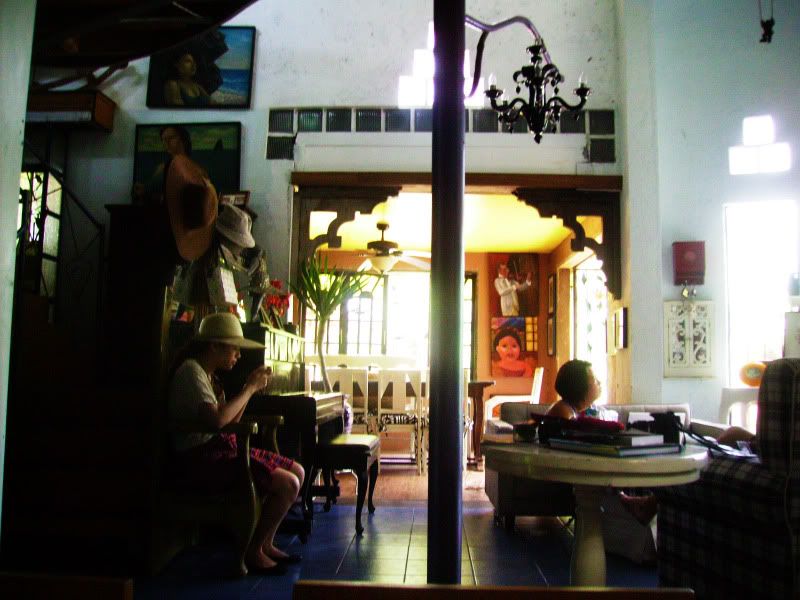
 11:18 PM |
One Afternoon in Cafe Antonio
11:18 PM |
One Afternoon in Cafe Antonio

 10:22 AM |
Here's to Memorable Fictional Characters
10:22 AM |
Here's to Memorable Fictional Characters
 6:00 AM |
With Movies This Bad, I Might as Well Go Straight
6:00 AM |
With Movies This Bad, I Might as Well Go Straight

 4:41 AM |
Solidarity in Literature Without Borders
4:41 AM |
Solidarity in Literature Without Borders

 3:43 PM |
Red Letter Day
3:43 PM |
Red Letter Day

 1:19 AM |
Vicious Circles
1:19 AM |
Vicious Circles

 4:47 PM |
The Detour on the Way to Happiness
4:47 PM |
The Detour on the Way to Happiness

 12:23 PM |
Simple Glory
12:23 PM |
Simple Glory

 1:40 PM |
Sweet Confection
1:40 PM |
Sweet Confection

 9:28 AM |
This Boy Needs a Barber
9:28 AM |
This Boy Needs a Barber

 9:01 AM |
A Season in Heartbreak
9:01 AM |
A Season in Heartbreak

 7:29 PM |
Friends in a Candid Snapshot
7:29 PM |
Friends in a Candid Snapshot

 7:21 PM |
A Love Story in Search of Structure
7:21 PM |
A Love Story in Search of Structure

 10:54 AM |
Inspiration is Nonsense
10:54 AM |
Inspiration is Nonsense